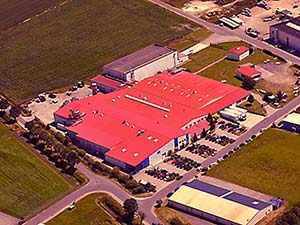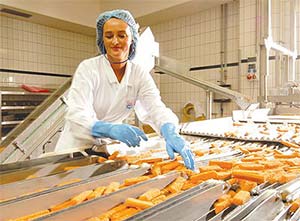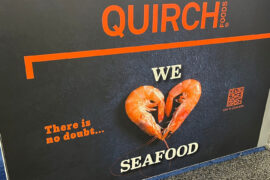The Seafood Traders (TST) frozen fish processing plant in Riepe, Germany, was purchased by Trident Seafoods Corp. on April 12. The Seattle, Washington-headquartered buyer also acquired Pickenpack Vertribes (PPV), the sales and distribution arm of Pickenpack, which filed for voluntary bankruptcy along with sister company TNT in December of 2015.
 The deal marks the entry of Trident, which ranks as the largest vertically-integrated seafood harvesting, processing and marketing enterprise in the United States, into Europe’s value-added fish production sector. For the past three decades or more it has exported frozen pollock blocks to clients in the EU for further processing, as well as sold a wide range of value-added products in the market.
The deal marks the entry of Trident, which ranks as the largest vertically-integrated seafood harvesting, processing and marketing enterprise in the United States, into Europe’s value-added fish production sector. For the past three decades or more it has exported frozen pollock blocks to clients in the EU for further processing, as well as sold a wide range of value-added products in the market.
“The company we acquired has long been a major user and marketer of single-frozen wild Alaska pollock, and this is a logical fit for us,” said Trident CEO Joe Bundrant. “We can now offer European customers the assurance of full control of our product supply chain at a time when transparency is becoming increasingly important to consumers.”
Noting that “From the Source to the Plate” is both a motto and a fundamental value at Trident, which operates a fleet of 26 trawl catcher-vessels, floating processors and crab catchers that feed company-owned processing plants in Alaska, Washington, Oregon, Minnesota and Georgia, Bundrant added:
“The opportunity to move closer to the European market is one we have dreamt about for a long time, and we take great pride in this accomplishment. Genuine Alaska pollock is a staple of German fish consumption and it has been recognized by consumers for its superior quality, sustainability and traceability. That’s why it is one of the most popular wild seafood species in Europe.”
The European headquarters of Trident Seafoods is based in Lüneburg, Germany, which also happens to be the home of the flagship Pickenpack seafood processing factory plant scheduled to shut down on June 30 if a buyer is not found to take it over. An insolvency administrator based in Hamburg announced last week that efforts to interest investors in the business have not been successful thus far, which means that it is likely that as many as 400 workers could soon lose their jobs.
Between the Riepe and Lüneburg facilities, Pickenpack’s combined production capacity had loomed upwards of 85,000 tons per annum at its zenith, with sales value averaging EUR 275 million. The Riepe plant, situated near Emden, not far from the North Sea in Lower Saxony, reportedly processes more than 30,000 tons of frozen fish blocks per year.
Greenland Seafoods Buys Gelmer
 Meanwhile, a separate purchase of another frozen fish processing operation with connections to Pickenpack, the Gelmer SAS plant in France, was also finalized on April 12. Wilhelmshaven, Germany-based Greenland Seafoods sealed the deal after getting approval from French authorities. It is believed that this will increase Greenland’s processing volume by 20%, and that most of the 200 people who work at the Boulogne-sur-Mer factory will remain employed for the foreseeable future.
Meanwhile, a separate purchase of another frozen fish processing operation with connections to Pickenpack, the Gelmer SAS plant in France, was also finalized on April 12. Wilhelmshaven, Germany-based Greenland Seafoods sealed the deal after getting approval from French authorities. It is believed that this will increase Greenland’s processing volume by 20%, and that most of the 200 people who work at the Boulogne-sur-Mer factory will remain employed for the foreseeable future.
The complicated transaction followed an agreement inked on March 17 among Gelmer, Asarmona, Europaco, Pickenpack companies, and various Pacific Andes Enterprises that supply raw material to Gelmer, Pickenpack, TST and Greenland Seafoods.





